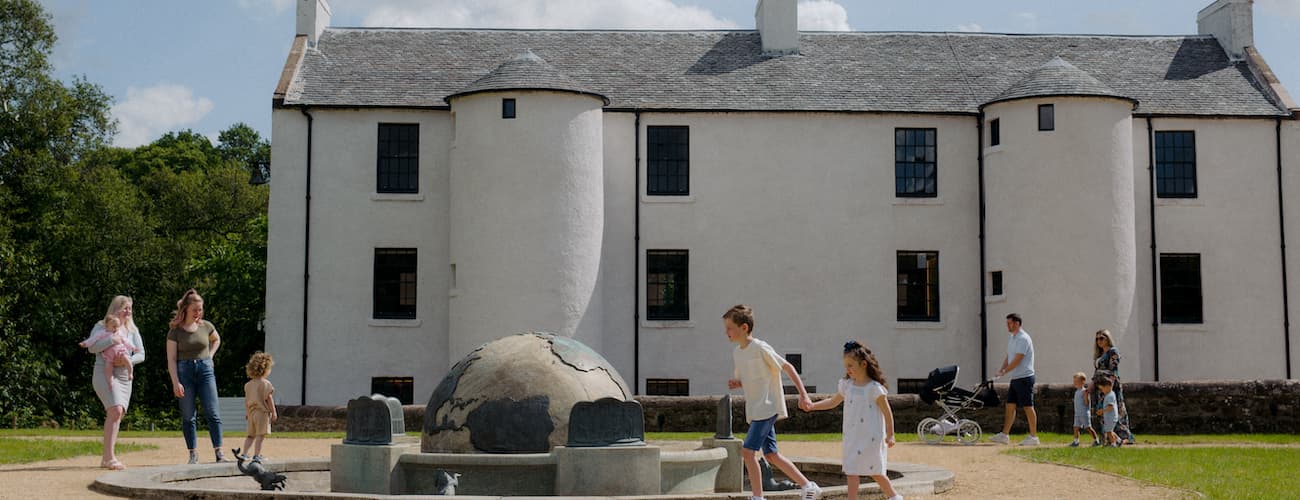Mini Series - Tunya Investigates! Episode 4 - Religion
In this episode of Tunya Investigates, we’re talking to Douglas who is a volunteer tour guide and museum trustee with the David Livingstone Trust.
Douglas is also a former Christian missionary, a bit like David Livingstone! We talk to Douglas about the differences between missionary work in David’s time and missionary work today, as well as the importance of faith to Livingstone and to Douglas himself.
Transcript
Tunya: Hello and welcome to Tunya Investigates, today I’m talking to Douglas Hay, who is a trustee and volunteer tour guide with the David Livingstone Trust. Like David Livingstone himself, Douglas used to be a Christian missionary, so I thought it would be really interesting to talk to him about David’s faith and how it impacted his life and work. We hope you enjoy the program.
Hello Douglas, thanks very much for talking to me today. Could you tell me a little bit about your role in the David Livingstone Birthplace Project?
Douglas: Yes, good morning Tunya. I am one of the Trustees of the David Livingstone Trust. Who have overall responsibility for the centre at Blantyre and all the work that is done there in the Trust’s name. Including the Birthplace Project, which has allowed the museum to be extended and improved, with a new and exciting exhibition which we’re hoping will open soon. I’m also one of the volunteer guides, who accompany visitors around the museum to tell them about Dr Livingstone’s life and work, but at present when the museum has been closed, I help with conservation work which means looking after the objects and doing research into their history.
Tunya: Oooh that sounds like a lot of fun. And what was it that first drew you to David Livingstone as a character?
Douglas: Well, I’m a member of Hamilton United Reformed Church, which used to be known as Hamilton Congregational Church. And when I attended Sunday School there, we were told that David Livingstone used to walk from Blantyre to Hamilton every Sunday with his family, to worship in the building being used at that time. Through this connection then, we would often go to the David Livingstone Birthplace at Blantyre on day trips to play in the park and visit the museum – where I learnt of David’s childhood in Blantyre, his work in the mill, his adventures in Africa as a missionary. After I graduated from University, I too applied to go overseas as a Missionary. For the Council for World Mission, which was formally the London Missionary Society. I spend five years in Botswana in Africa.
So, in answer to your question Tunya, it was David’s spirit of Adventure that attracted and inspired me.
Tunya: That’s amazing! And how do you think David Livingstone’s faith might have influenced his life and shaped his actions?
Douglas: David’s faith was the basis of all he did in life. He was brought up in a Christian family and attended Sunday school in Blantyre, where he learnt stories about Jesus from the bible. In fact, he won a prize of a New Testament at a young age – for reciting Psalm 119. Which is the longest Psalm in the Bible, consisting of 176 verses and it is reported that he only made five mistakes. Which was quite a feat for one so young. However, as he grew up, he found some of the teachings from the bible difficult to understand and he struggled with this through his teenage years until he read a book, which helped him so much that he became a much happier person, who believed that God would always guide and look after him. So much so that he wanted to share this with others, to help them to believe in the teachings of Jesus. And then one day, his father brought home a leaflet about a medical missionary Karl Gützlaff – who worked in China. And this inspired David so much, that he too wanted to go to China. However, this proved impossible at that time, so David applied to the London Missionary Society, and they agreed to send him to Southern Africa after he had finished his education and training. So, David’s faith is what led him to Africa and guided and supported him through everything that he experienced there.
Tunya: Hmmm...And how do you think his life might have influenced his faith?
Douglas: David’s life in Africa wasn’t easy. He travelled long distances on foot often in difficult conditions. Sometimes the weather was very hot and dry, and sometimes it was very hot and wet. Many times, he had to walk through swaps and rivers and there were many occasions, when he became very ill through catching diseases like Malaria and Dysentery. Some of the people he encountered were friendly, but others were very hostile. David nearly dies on several occasions by having spears thrown at him, and by being attacked by wild animals. In fact, Tunya, he was once attacked by a Lion.
Tunya: Oh no!
Douglas: Now you might think this would've given up and go home, but the fact that he survived all of this, thanks to the support of his companions, David was actually encouraged and this strengthened his faith as it reinforced his belief that God was looking after him and that He had a purpose for him in Africa.
Tunya: Of course, that’s really interesting thank you! And could you tell us a little bit about what missionary work actually is? And what this might’ve meant for David?
Douglas: An understanding of being a missionary has changed over the years, Tunya. When David went out to Africa in 1840, he was going primarily to tell people about Jesus, to share his belief in the teachings of the bible, in the hope that they too would want to become Christians. However, as well as wanting to help people’s spiritual life, David also wanted to improve their physical life. This is why he trained as a doctor, so that he could use his knowledge and skills to help others, when they were ill or injured. Nowadays, we recognise the churches overseas have their own trained evangelist ministers, who look after their members spirituality. So, missionaries today who are called to go overseas, tend to go to do a specific piece of work, which the church has expressed a need for.
For example, in 1977, I went to Botswana to teach in a secondary school, which was run by the church there.
Tunya: Hmm, that must’ve been a real adventure. And what does your faith mean for you?
Douglas: Well Tunya, my faith certainly has never been tested as dramatically as David Livingstone, but it has sustained and supported me in all that I have been able to do. Especially during the difficult times. As I like other Christians, try to follow the teachings of Jesus as we walk the way of Jesus today.
Tunya: Hmmm, that’s lovely...Thank you so much for sharing that with me Douglas. Thanks very much for listening everybody, we hope you enjoyed hearing about David’s life from the perspective of Douglas a volunteer at the museum and a former Christian Missionary. Join us next time when we’ll be talking to Fizza, another one of our volunteers who is currently researching David’s many encounters with people with other faiths and beliefs...






